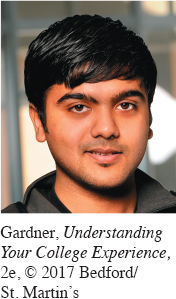Student Profile with Introduction
PROFILE


Rahm Patel, 19
Accounting Technology Major, Palm Beach State College, Florida

“I realized that eating right, exercising, and sleeping would help me be less anxious and more in control in all of my classes.”
When Rahm Patel started attending Palm Beach State College, he was expecting to have a lot of fun. After the first week of classes when he received the syllabus for each course, he could tell he was going to have to work hard. “To make more study time, I cut back on going to the gym each week,” he explained. “I started skipping lunch to save time and ate snacks from vending machines between classes instead.” He also found himself sleeping less and eating more junk food during the exam weeks. It was a perfect storm. As Rahm stopped exercising and started eating junk food and sleeping poorly, stress and anxiety got the better of him. It all came to a head just before a scheduled class presentation. He knew he wasn’t ready to do his best, so he e-mailed his instructor and asked for an extension, which his instructor granted. But even with the extension, Rahm’s presentation did not go well. His lack of preparation was obvious to the instructor and the other students. Along with a grade of C minus, the instructor, Dr. Cruz, also attached a personal note that read:
Dear Rahm,
I know you are not happy about your performance in class today and your grade. I also was very disappointed in your presentation, especially since I had granted you an extension. I have also noticed that you seem tired and distracted and have fallen asleep in class on more than one occasion. If you continue on this path, your final course grade will suffer. I would like to suggest that you make an appointment to see a college counselor to talk over what’s going on in your life and how you can turn this around before it’s too late.
Dr. Cruz
“I was really embarrassed that Dr. Cruz had noticed how I had changed,” Rahm admitted. “I really didn’t have a relationship with any of my instructors, but I figured I better take her advice and go to the counseling center.” The counselor had a long conversation with Rahm, and he was honest about the changes in his sleeping, eating, and exercise habits and how his overall attitude about classwork had changed. The counselor shared some articles with him about how physical and mental wellness connect. Rahm didn’t want a repeat of what had happened. “I realized that eating right, exercising, and sleeping would help me be less anxious and more in control in all of my classes,” said Rahm.
After reading the articles and working with the counselor, he developed a new plan for gaining more control over his life. The counselor also advised Rahm to visit Dr. Cruz during office hours to get to know her and to discuss how he could improve his performance in class. In their meeting, Dr. Cruz promised to work with Rahm on his presentation skills and to help him become more organized in his study strategies. Rahm was pleasantly surprised by how much he enjoyed his visit with his instructor.
Like Rahm, many college students need help in managing their lives when they enter college. This chapter focuses on helping you manage significant components of your life while in college: your personal wellness and relationships with the people you encounter throughout your college experience and beyond. When life is busy or when all your energy is focused on one thing in particular, you might find yourself off balance, not paying enough attention to yourself or the many people around you. By taking a broad view of your life and where it’s going, you can see where you need to make adjustments.
The first year of college can be one of life’s most interesting and challenging transitions. Much of what you experience will be new—new friends, new freedoms, and new responsibilities. The college experience shouldn’t only be about studying. To make the most of the college years, it’s important to spend time with friends and enjoy activities your college has to offer. The freedoms you experience in this new environment bring challenges and risks, and you need to learn to handle them. Your success in and after college depends on your ability to make sensible decisions about your personal habits and behaviors, to learn to maintain important relationships and cultivate new ones, and to achieve balance; that is what this chapter is all about.